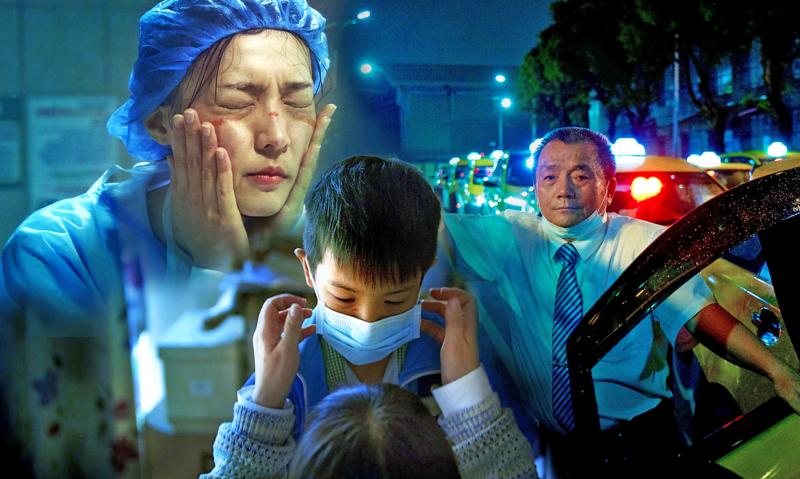Since the beginning of this year, the world has faced the unprecedented impact of the COVID-19 pandemic, which has changed the way of life familiar to everyone.
To highlight the success of the government’s relief efforts, CTBC Bank (中國信託銀行) on Sunday launched its Our Ordinary Home (家.如常) corporate video on major TV channels and social media platforms.
CTBC Bank said that it obtained permission from Taiwan’s international friends to use their remarks in the video, affirming the nation’s successful epidemic prevention measures.

Photo courtesy of CTBC Bank
The video also shows how Taiwanese battled COVID-19 in their daily lives, with the aim of conveying a message of “getting together, there is hope,” the bank said.
The video begins depicting an ordinary day in Taiwan, where students go to school and people visit restaurants when they are hungry.
This contrasts with the lives of those in other nations that have been more severely affected by the pandemic, highlighting the efforts of Taiwanese to fight the disease together and maintain their precious way of life.
This spirit stems from Taiwanese becoming accustomed to facing international predicaments alone over the decades, and people have become stronger following major historical events such as the nation withdrawing from the UN, the loss of official diplomatic relations with the US and fighting the SARS outbreak, CTBC Bank said.
The video revisits some of these historical news events and recreates the way of life of Taiwanese in the 1970s, it said.
Through the voices of former Taiwan Television Enterprise news anchor Sheng Chu-ju (盛竹如) and former Government Information Office director-general James Soong (宋楚瑜), it brings memories of the past back to life, it added.
Despite the international community’s indifference to Taiwan over the past 50 years, the nation still fulfills its responsibilities as a good global citizen and loves the rest of the world like family, CTBC Bank said.
As the effectiveness of Taiwan’s epidemic prevention measures has been mentioned many times by its international friends, CTBC Bank gained the permission of those friends, such as Canadian lawmaker Michael Cooper and Japanese Deputy Prime Minister Taro Aso, to quote their remarks affirming Taiwan’s achievements.
The video also shows taxi drivers and snack bar owners working hard, and greeting their overseas relatives and friends through video messages, emphasizing that Taiwanese work hard to protect their homeland, the manifestation of the spirit of CTBC’s “We are family” brand.

Intel Corp chief executive officer Lip-Bu Tan (陳立武) is expected to meet with Taiwanese suppliers next month in conjunction with the opening of the Computex Taipei trade show, supply chain sources said on Monday. The visit, the first for Tan to Taiwan since assuming his new post last month, would be aimed at enhancing Intel’s ties with suppliers in Taiwan as he attempts to help turn around the struggling US chipmaker, the sources said. Tan is to hold a banquet to celebrate Intel’s 40-year presence in Taiwan before Computex opens on May 20 and invite dozens of Taiwanese suppliers to exchange views

Application-specific integrated circuit designer Faraday Technology Corp (智原) yesterday said that although revenue this quarter would decline 30 percent from last quarter, it retained its full-year forecast of revenue growth of 100 percent. The company attributed the quarterly drop to a slowdown in customers’ production of chips using Faraday’s advanced packaging technology. The company is still confident about its revenue growth this year, given its strong “design-win” — or the projects it won to help customers design their chips, Faraday president Steve Wang (王國雍) told an online earnings conference. “The design-win this year is better than we expected. We believe we will win

Chizuko Kimura has become the first female sushi chef in the world to win a Michelin star, fulfilling a promise she made to her dying husband to continue his legacy. The 54-year-old Japanese chef regained the Michelin star her late husband, Shunei Kimura, won three years ago for their Sushi Shunei restaurant in Paris. For Shunei Kimura, the star was a dream come true. However, the joy was short-lived. He died from cancer just three months later in June 2022. He was 65. The following year, the restaurant in the heart of Montmartre lost its star rating. Chizuko Kimura insisted that the new star is still down

While China’s leaders use their economic and political might to fight US President Donald Trump’s trade war “to the end,” its army of social media soldiers are embarking on a more humorous campaign online. Trump’s tariff blitz has seen Washington and Beijing impose eye-watering duties on imports from the other, fanning a standoff between the economic superpowers that has sparked global recession fears and sent markets into a tailspin. Trump says his policy is a response to years of being “ripped off” by other countries and aims to bring manufacturing to the US, forcing companies to employ US workers. However, China’s online warriors